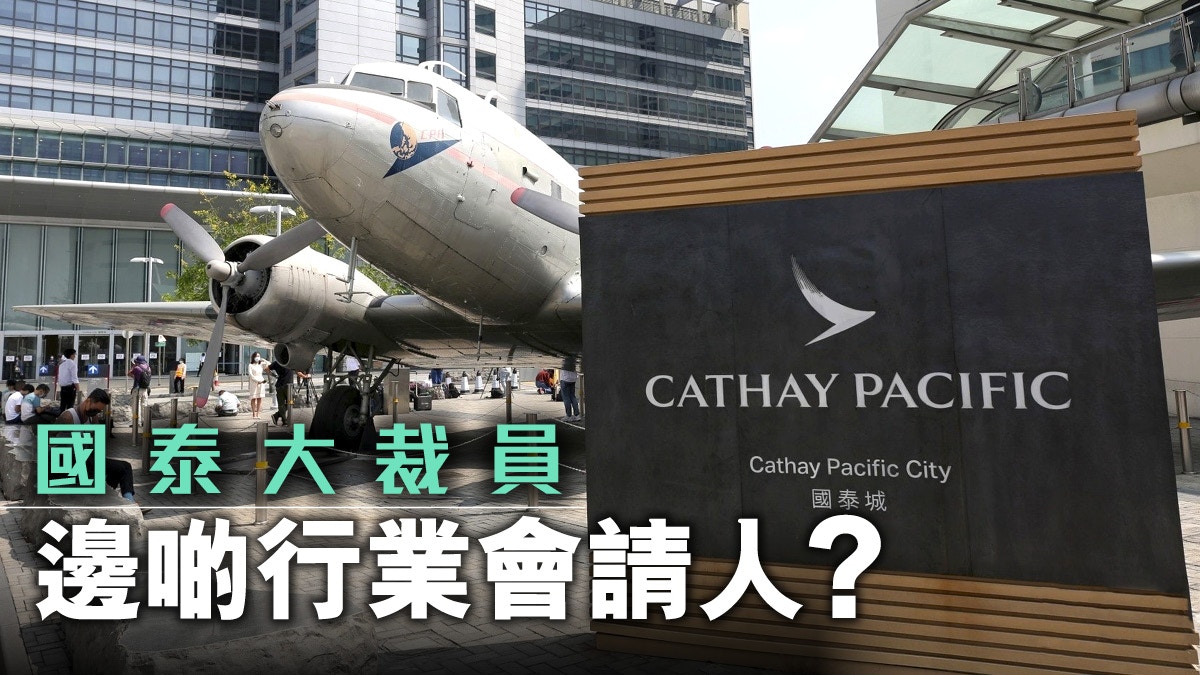editorial
Written by: Hong Kong 01
2020-10-27 06:00
Last update date: 2020-10-27 06:00
Last Wednesday (October 21), the Cathay Pacific Group announced its restructuring plan, deciding to lay off approximately 5,300 Hong Kong employees and cease operations of its subsidiary Cathay Dragon, which is known as the largest layoff in Hong Kong history.
Based on the current labor force of approximately 3.9 million, the relevant decision will at least immediately push up the local unemployment rate by more than 0.1%. Moreover, the closure of Dragonair will trigger a subsequent ripple effect, leading to more companies closing or dismissing employees, plus anti-epidemic The fund's "Ensure Employment" funding plan will be completed next month, which has further aggravated society's concerns about the economic situation at the end of the year.
Nevertheless, for Hong Kong people who have suffered from the political turmoil and the new crown pneumonia epidemic in the past year, this situation may have long been expected.
The real question is whether the current economic structure of Hong Kong is capable of promoting the transformation and upgrading of traditional industries and increasing employment opportunities?
If Hong Kong continues to have new industries born, there will naturally be no shortage of new job opportunities. Even if a large company lays off employees, it will not appear to be a terrible thing. Lost jobs can be easily replaced in other fields. Unfortunately, for many years, our The system can only achieve "sitting landslides," and it completely lacks long-term plans to increase employment through the development of new industries.
From this perspective, the subsequent responses of all sectors of society may be more worthy of our attention than the layoffs of Cathay Pacific.
First, senior real estate agents publicly expressed their welcome to join the company in the aviation service industry, and immediately updated their recruitment advertisements to include "transition runway" and other promotional words specifically for them; later, public opinion renewed their hope to speed up the implementation of the "Gangkang Code", Measures such as the "tourism bubble" to revive the local tourism industry, as if they were the only way to save Hong Kong's economy... The series of reactions made people feel as if Hong Kong had no other major industries other than real estate and tourism, flight attendants. After being forced to leave, he can only join one of them.
Compared with the layoffs of Cathay Pacific, the subsequent responses of all sectors of society may be more worthy of our attention.
(Profile picture)
Industry development only has employment
In 2002, the then Financial Secretary, Leung Kam-sung, listed finance, trade and logistics, tourism, and professional services as Hong Kong's "four pillars" in his speech in the Budget.
What needs to be emphasized is that at that time, Leung Kam-sung described the "four pillars" as important high-value-added economic activities that "can promote the development of other industries, promote the overall economy, and promote employment." It can be seen that these "pillars" were proposed to stimulate the Hong Kong economy It is absolutely not necessary to maintain the existing industrial structure as it is now, or even hinder the development of other industries or restrict the work choices of Hong Kong people.
Take the aviation industry, which has aroused public attention this time, as an example. Under the premise that the Basic Law stipulates "maintain Hong Kong's status as an international and regional aviation center" and authorizes the Hong Kong government to sign civil air services agreements on its own, Hong Kong should have long been Seize the opportunity to actively promote the training of local pilots and strengthen the competitiveness of the aviation industry. However, even the Hong Kong International Aviation Academy established by the Airport Authority in 2016 did not provide relevant pilot courses, which just shows that the authorities have no intention of assisting Hong Kong people to participate in this. Among high value-added industries, let alone transform them into new "pillar" industries that help local employment.
Of course, the Hong Kong government is not without the opportunity to support new industries other than the "four pillars."
In 2009, the then Chief Executive Donald Tsang proposed in the Policy Address that “toward a high value-added knowledge-based economy, maintain a leading edge, and create more quality job opportunities”, and in response to the recommendations of the Economic Opportunity Committee, he proposed cultural and creative, education, and medical The "six major industries", environmental protection, innovative technology, testing and certification, were originally a good opportunity for Hong Kong to use them to initiate the transformation and reform of local industries. However, after ten years, there has not been much success.
The innovative technology industry, which belongs to the "six major industries," is even more a joke among the jokes.
(Information Picture/Photo by Lu Yiming)
Weak support for emerging industries
Among these "six major industries", the cultural and creative industries clearly have great potential for development, and their proportion of GDP was initially even slightly higher than that of the tourism industry, one of the "four pillars."
With helpless government support, this advantage was finally subverted in 2014.
However, in recent years, Hong Kong people still have excellent creative abilities. Since the anti-revision movement last year, the yellow and blue camps have thrown out endless propaganda products. If these resources and talents can be transferred to the development of the local cultural and creative industry, it will be very important for Hong Kong. The benefit is definitely greater than allowing them to continue to invest in unnecessary political disputes.
As the testing and certification industry, another member of the "six major industries," its prospects have also been revealed under this new crown pneumonia epidemic.
Unfortunately, due to the Hong Kong government’s inability to effectively promote the development of related industries, the testing and certification industry’s share of GDP and employment in the past ten years has actually remained unchanged.
This year, Hong Kong’s ability to detect viruses lags far behind neighboring regions. As a result, it is necessary to request support and assistance from the Mainland to carry out large-scale national testing. Although there are authorities in Xiezhong who carefully deal with the consideration of cooperation with private enterprises, they can only be said to be the Hong Kong government. The consequences of the failure of industrial policy.
And the innovative technology industry, which belongs to the "six major industries," is even more a joke in a joke.
The Lok Ma Chau Loop Innovation and Technology Park, which has not yet been completed, has been included in the "Top Ten Infrastructure" in 2007 for more than ten years, but it has long been used as evidence of the Hong Kong government's support for the innovation and technology industry.
Since President Xi Jinping’s speech at the 40th anniversary celebration of the establishment of the Shenzhen Special Economic Zone in the middle of the month specifically mentioned the need to "plan and build the Loop Shenzhen-Hong Kong Science and Technology Innovation Cooperation Zone", this issue may have attracted the attention of the central government. Is Hong Kong still going to squander in this regard?
Cathay Pacific has gradually declined in the past decade-when global aviation industry demand fell due to soaring oil prices in 2008, Cathay Pacific was also severely affected, with a loss of 8.558 billion yuan.
(Data Picture / Photo by Yu Junliang)
The industrial structure is in urgent need of transformation
The layoffs of the Cathay Pacific Group are just an accident. From an objective point of view, it is a large-scale company rooted in Hong Kong unfortunately affected by external political and social factors, which dragged down its business, and was eventually forced to make a difficult business decision that hit the local economy. ; In the future, as the environment changes, the Cathay Pacific Group is likely to re-employ employees in Hong Kong.
However, if it hires mainly foreign pilots by then, and there are still only a few young Hong Kong people with good academic qualifications and appearance conditions, they can be selected as flight attendants, while other job seekers can only choose to go back to work as brokers. Or the tour guide, that's the really sad thing.
It is impossible for a place to maintain a permanent industrial structure, such as the "pillar" industry of trade and logistics, which Hong Kong has flourished in the past. The proportion of GDP in the country has dropped from about a quarter of 2000. As of 2018, it was less than 20%. As for the manufacturing industry, which also accounted for nearly a quarter of GDP in the 1980s, it dropped to only 1% in 2018.
The above figures are enough to remind us that the transformation of industrial structure is an inevitable historical process, and it is a task that must be continued at any period, so as to maintain the competitiveness of a place.
When airline layoffs and closures occur today in Hong Kong, an international aviation hub, who can guarantee that the upward trend of the financial, real estate and professional services industries will not change?
On the other hand, if most Hong Kong people can only choose brokers as a way for value-added employment, how can Hong Kong become a sustainable international metropolis?
In order to cope with the potential challenges in the future, both the Hong Kong government and society must be prepared to formulate long-term diversified industrial development policies and stop repelling necessary reforms and transformations for the sake of safeguarding vested interests. Only in this way can Hong Kong society and economic system fail Will no longer be afraid of the impact of layoffs in large companies.
[Cathay Pacific layoffs] What happened to Cathay Pacific after Dragonair fell in 35 years?
[Cathay Pacific layoffs] The government should create more types of jobs and job opportunities
Cathay Pacific layoffs Dragonair suspends operations in Hong Kong's aviation industry but cannot shrink
Unemployment rate soaring Cathay Pacific layoffs relief measures urgent
Cathay Pacific layoffs | Hong Kong’s “only son” in the aviation industry should no longer be “doted”
Please pay attention to the 237th issue of "Hong Kong 01" Weekly News published on October 27, which is available at major newsstands, OK convenience stores and Vango convenience stores.
You can also click here to sample the weekly newsletter and read more in-depth reports.
Cathay Pacific Airways Cathay Pacific layoffs Dragonair Creative Industry Hong Kong Aviation Industry 01 View 01 Weekly Report




/cloudfront-eu-central-1.images.arcpublishing.com/prisa/JUSJMP3AZFFMVFE7EXS567CYJE.jpg)
/cloudfront-eu-central-1.images.arcpublishing.com/prisa/Q6UJ4IEP6ZGLZLS3MSHF7LNYOU.jpg)


